 Technology peripherals
Technology peripherals AI
AI The prospects for IT investment next year are promising: the growth rate is three times higher than GDP! 75% of CIOs want to spend more money on AI
The prospects for IT investment next year are promising: the growth rate is three times higher than GDP! 75% of CIOs want to spend more money on AIToday, the global recovery is still slow. According to the recently released "World Economic Outlook Report" by the International Monetary Fund (IMF), global economic growth is expected to slow down from 3.5% in 2022 to 3.0% in 2023 and 2024. 2.9%. However, Gartner's IT spending data shows a sharp contrast: global IT spending is expected to grow by 8% in 2024. As the global economy slows down, IT spending bucks the trend and rises.
Recently, Gartner released the top ten strategic technology trends in 2024 and the forecast of global IT spending levels in 2024. The forecast is mainly based on the analysis of the sales of more than a thousand IT suppliers.
3/4 CIOs increase investment in AI, but spend little on generative AI
Gartner predicts: Global IT spending is expected to reach $5.1 trillion in 2024, Compared with US$4.7 trillion in 2023, a year-on-year increase of 8%.
 The IT investment prospects for next year are promising: the growth rate is 3 times higher than GDP! 75% of CIOs want to spend more money on AI
The IT investment prospects for next year are promising: the growth rate is 3 times higher than GDP! 75% of CIOs want to spend more money on AIGlobal IT Spending Forecast
According to the chart, the overall growth in 2023 will be relatively slow, and there are many factors leading to this situation. Examples include a sharp drop in consumer demand, inflation and economic uncertainty. The most obvious one is that consumer equipment purchases continue to slow down. According to Gartner forecasts, equipment spending this year is expected to drop by about 10%.
This decline in demand actually started in 2022. According to statistics, in the fourth quarter of 2022, global smartphone shipments fell by 18.3% year-on-year, the largest single-quarter decline on record. Full-year shipments were 1.21 billion units, a sharp decline of 11.3%, the highest since 2013. Minimum annual shipments. Global shipments of personal computers (PCs) fell nearly 29% year-on-year in the fourth quarter, marking the largest quarterly decline since the mid-1990s.
But in 2024, equipment spending will rebound, growing 4.8% to reach $722.47 billion.
The data center market has also experienced significant demand fluctuations in the past two years. In 2022, the market will grow by 19.7% year-on-year to reach $227 billion. According to forecasts, this growth rate will slow to 4.7% in 2023, then increase to 9.5% in 2024, and is expected to exceed US$260 billion next year.
Software spending has been relatively stable in the past two years and will grow by 13.8% in 2024, exceeding US$1 trillion. This is mainly driven by cloud services. Global public cloud service spending is expected to grow by 20.4% in 2024. Similar to 2023, the growth mainly comes from cloud provider price increases and increased utilization.
In addition, cybersecurity also drives software spending. In a Gartner survey, 80% of CIOs said they planned to increase cybersecurity spending in 2024. "AI brings new security threats to enterprises." said John-David Lovelock, vice president analyst at Gartner. "We expect double-digit growth in enterprise security spending in 2024."
The IT services and communication services sectors are the two largest markets covered by the forecast. The IT services market is expected to grow 10.4% next year to approximately US$1.547 trillion. The communications services market will grow by 3.3% to reach US$1.497 trillion.
Enterprises also continue to invest in AI and automation to improve operational efficiency and narrow the IT talent gap. Nearly three-quarters (73%) of CIOs surveyed by Gartner said their companies will increase investment in AI/ML in 2024.
However, specific to generative AI, although it has received widespread attention from the industry, it has not yet had a "substantial impact" on IT spending. "In 2023 and 2024, there will be very little IT spending related to generative AI." Lovelock express.
In fact, CIOs are experiencing change fatigue, manifested by their hesitancy to invest in new projects and initiatives, deferring some IT spending from 2023 to 2024, and this trend is expected to continue into 2025.
Lovelock said: "Facing a new wave of pragmatism, capital constraints or profit pressures, CIOs are deferring some IT spending. Enterprises are shifting the focus of IT projects to cost control, efficiency improvements and automation, while Cut back on IT initiatives that will take longer to deliver a return.” Top 10 strategic technology trends that will dominate the tech industry in the coming year.
The IT investment prospects for next year are promising: the growth rate is 3 times higher than GDP! 75% of CIOs want to spend more on AI

AI Trust, Risk and Security Management (AI TRiSM)
The popularity of AI has led to more urgent and clear needs for AI trust, risk and security management. Gartner believes that without protective measures, AI models may quickly produce multiple negative effects or even get out of control, negating all the positive benefits brought by AI. Gartner predicts that by 2026, enterprises applying AI TRiSM controls will improve decision-making accuracy by eliminating 80% of erroneous and illegal information.
Continuous Threat Exposure Management (CTEM)
Continuous Threat Exposure Management is a pragmatic and systematic approach that allows organizations to continuously and consistently assess their digital and physical Accessibility, exposure and exploitability of assets. Aligning CTEM assessment and remediation scope with threat vectors or business projects will uncover not only vulnerabilities but also threats that cannot be patched. Gartner predicts that by 2026, enterprises that prioritize security investments under CTEM initiatives will reduce vulnerabilities by two-thirds.
Sustainable Technology
Sustainable Technology is a framework of digital solutions that supports long-term ecological balance and human rights. The application of technologies such as artificial intelligence, cryptocurrency, the Internet of Things, and cloud computing has led to increasingly urgent concerns about energy consumption and the environment. It has become even more critical to ensure that the use of IT is more efficient, recyclable, and sustainable. Gartner predicts that by 2027, 25% of CIO compensation will be tied to their impact on sustainable technology.
Platform Engineering
Platform engineering refers to the discipline of building and operating self-service internal development platforms. Each platform is created and maintained by a dedicated product team and interfaces with tools and processes to support user needs. The goal of platform engineering is to optimize productivity and user experience and accelerate business delivery.
AI enhanced development
AI enhanced development refers to the use of AI technologies such as generative AI and machine learning to help software engineers design, code and test applications. Gartner said that these development tools infused with AI capabilities can reduce the time software engineers spend writing code and improve developers' productivity. They can spend more time doing more strategic things, allowing development teams to meet growing business needs.
Industry Cloud Platform
Gartner predicts that by 2027, more than 70% of enterprises will use industry cloud platforms to accelerate business plans. In 2023, this proportion will still be Less than 15%. Industry cloud platforms are provided by combining underlying SaaS, PaaS and IaaS services into an overall product. This often includes industry data weaving, libraries of packaged business capabilities, composition tools, and other platform innovation capabilities. Industry cloud platforms are customized cloud solutions for specific industries and can be further customized according to customer needs.
INTELLIGENT APPLICATIONS
Gartner defines “intelligence” in intelligent applications as the learned adaptive ability to respond appropriately autonomously. This intelligence is used in many use cases to enhance and automate work. As a basic capability, intelligence in applications includes various AI-based services such as machine learning, vector storage, and connected data. These smart applications can provide an experience that continuously adapts to the user. The need for smart applications is now clear.
Generative AI for everyone
Gartner said that the integration of large-scale pre-training models, cloud computing and open source is making generative AI democratized. Make these models available to workers around the world. Gartner predicts that by 2026, more than 80% of enterprises will use generative AI APIs and models or deploy generative AI applications in production environments, up from less than 5% in early 2023. Generative AI applications can provide enterprise users with access to a large number of internal and external information sources, which means a significant increase in the popularity of enterprise knowledge and skills.
Augmented Connected Workforce
The Augmented Connected Workforce (ACWF) is a strategy for optimizing employee value, and demand for talent is driving this trend. ACWF will use smart applications and workforce analytics to provide employees with an environment and guidance that enhances their experience, well-being and skills. Gartner predicts that by 2027, 25% of CIOs will use an enhanced connected workforce, reducing the time required to complete key positions by 50%.
Machine Customer
A machine customer is a machine customer that can negotiate and purchase goods and services independently. By 2028, there will be 15 billion connected products with the potential to serve as customers, and Gartner predicts that this growth will generate trillions of dollars in revenue by 2030.
The above is the detailed content of The prospects for IT investment next year are promising: the growth rate is three times higher than GDP! 75% of CIOs want to spend more money on AI. For more information, please follow other related articles on the PHP Chinese website!
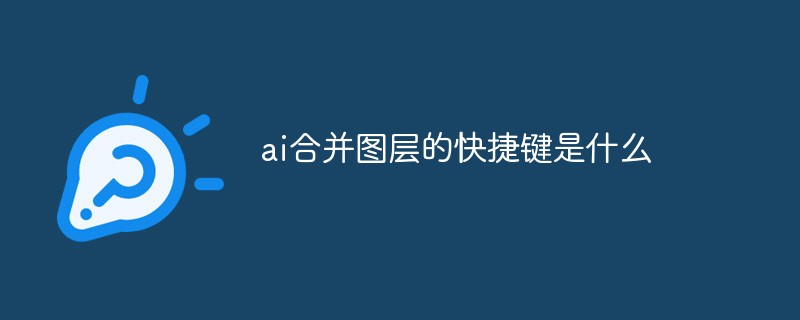 ai合并图层的快捷键是什么Jan 07, 2021 am 10:59 AM
ai合并图层的快捷键是什么Jan 07, 2021 am 10:59 AMai合并图层的快捷键是“Ctrl+Shift+E”,它的作用是把目前所有处在显示状态的图层合并,在隐藏状态的图层则不作变动。也可以选中要合并的图层,在菜单栏中依次点击“窗口”-“路径查找器”,点击“合并”按钮。
 ai橡皮擦擦不掉东西怎么办Jan 13, 2021 am 10:23 AM
ai橡皮擦擦不掉东西怎么办Jan 13, 2021 am 10:23 AMai橡皮擦擦不掉东西是因为AI是矢量图软件,用橡皮擦不能擦位图的,其解决办法就是用蒙板工具以及钢笔勾好路径再建立蒙板即可实现擦掉东西。
 谷歌超强AI超算碾压英伟达A100!TPU v4性能提升10倍,细节首次公开Apr 07, 2023 pm 02:54 PM
谷歌超强AI超算碾压英伟达A100!TPU v4性能提升10倍,细节首次公开Apr 07, 2023 pm 02:54 PM虽然谷歌早在2020年,就在自家的数据中心上部署了当时最强的AI芯片——TPU v4。但直到今年的4月4日,谷歌才首次公布了这台AI超算的技术细节。论文地址:https://arxiv.org/abs/2304.01433相比于TPU v3,TPU v4的性能要高出2.1倍,而在整合4096个芯片之后,超算的性能更是提升了10倍。另外,谷歌还声称,自家芯片要比英伟达A100更快、更节能。与A100对打,速度快1.7倍论文中,谷歌表示,对于规模相当的系统,TPU v4可以提供比英伟达A100强1.
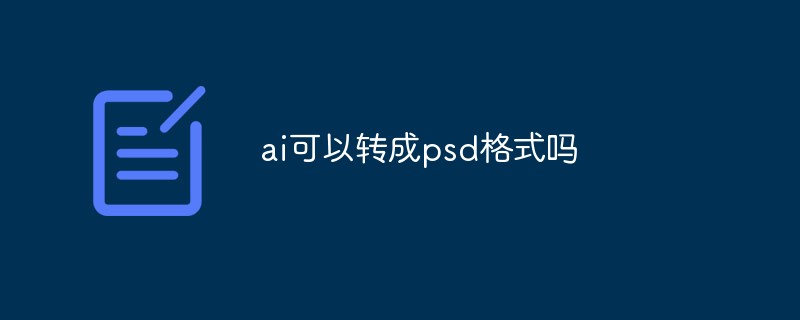 ai可以转成psd格式吗Feb 22, 2023 pm 05:56 PM
ai可以转成psd格式吗Feb 22, 2023 pm 05:56 PMai可以转成psd格式。转换方法:1、打开Adobe Illustrator软件,依次点击顶部菜单栏的“文件”-“打开”,选择所需的ai文件;2、点击右侧功能面板中的“图层”,点击三杠图标,在弹出的选项中选择“释放到图层(顺序)”;3、依次点击顶部菜单栏的“文件”-“导出”-“导出为”;4、在弹出的“导出”对话框中,将“保存类型”设置为“PSD格式”,点击“导出”即可;
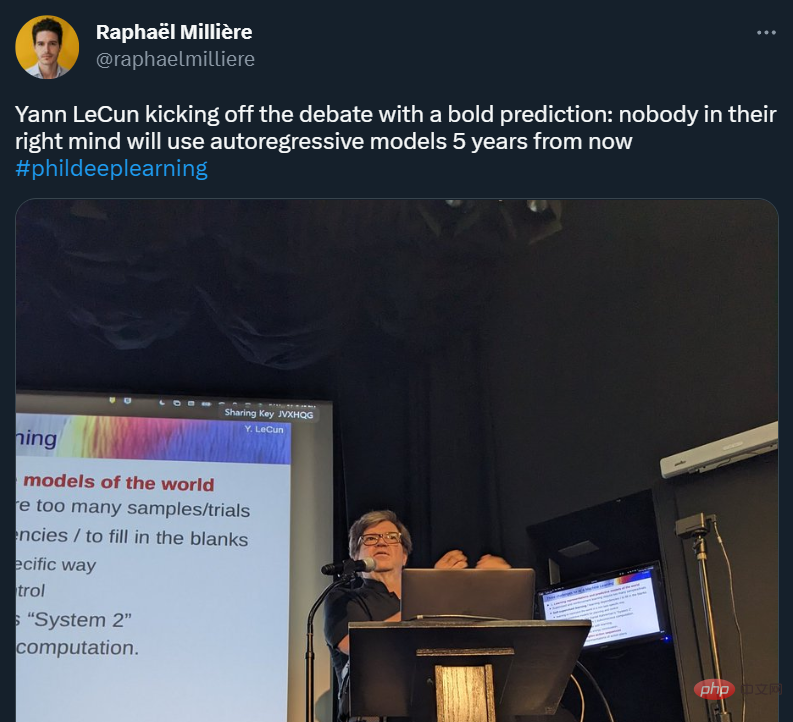 GPT-4的研究路径没有前途?Yann LeCun给自回归判了死刑Apr 04, 2023 am 11:55 AM
GPT-4的研究路径没有前途?Yann LeCun给自回归判了死刑Apr 04, 2023 am 11:55 AMYann LeCun 这个观点的确有些大胆。 「从现在起 5 年内,没有哪个头脑正常的人会使用自回归模型。」最近,图灵奖得主 Yann LeCun 给一场辩论做了个特别的开场。而他口中的自回归,正是当前爆红的 GPT 家族模型所依赖的学习范式。当然,被 Yann LeCun 指出问题的不只是自回归模型。在他看来,当前整个的机器学习领域都面临巨大挑战。这场辩论的主题为「Do large language models need sensory grounding for meaning and u
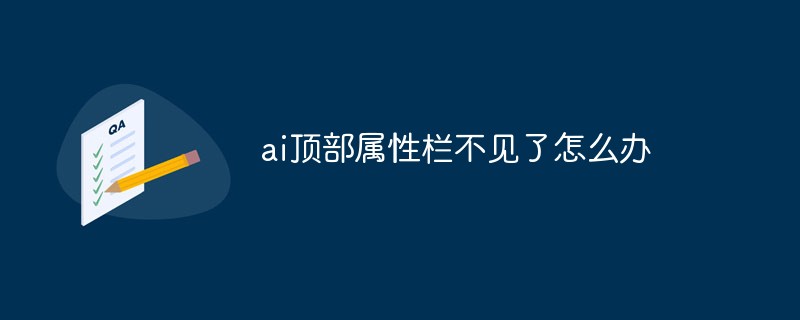 ai顶部属性栏不见了怎么办Feb 22, 2023 pm 05:27 PM
ai顶部属性栏不见了怎么办Feb 22, 2023 pm 05:27 PMai顶部属性栏不见了的解决办法:1、开启Ai新建画布,进入绘图页面;2、在Ai顶部菜单栏中点击“窗口”;3、在系统弹出的窗口菜单页面中点击“控制”,然后开启“控制”窗口即可显示出属性栏。
 ai移动不了东西了怎么办Mar 07, 2023 am 10:03 AM
ai移动不了东西了怎么办Mar 07, 2023 am 10:03 AMai移动不了东西的解决办法:1、打开ai软件,打开空白文档;2、选择矩形工具,在文档中绘制矩形;3、点击选择工具,移动文档中的矩形;4、点击图层按钮,弹出图层面板对话框,解锁图层;5、点击选择工具,移动矩形即可。
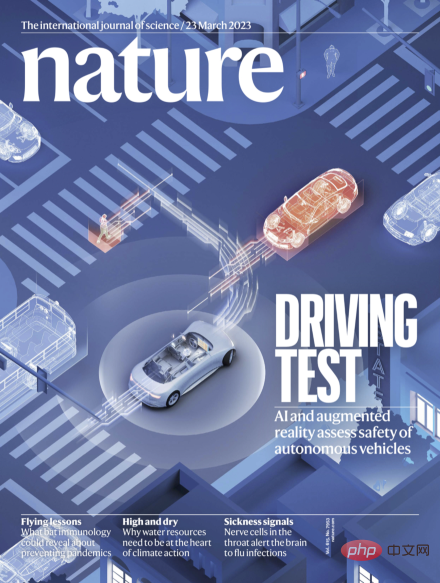 强化学习再登Nature封面,自动驾驶安全验证新范式大幅减少测试里程Mar 31, 2023 pm 10:38 PM
强化学习再登Nature封面,自动驾驶安全验证新范式大幅减少测试里程Mar 31, 2023 pm 10:38 PM引入密集强化学习,用 AI 验证 AI。 自动驾驶汽车 (AV) 技术的快速发展,使得我们正处于交通革命的风口浪尖,其规模是自一个世纪前汽车问世以来从未见过的。自动驾驶技术具有显着提高交通安全性、机动性和可持续性的潜力,因此引起了工业界、政府机构、专业组织和学术机构的共同关注。过去 20 年里,自动驾驶汽车的发展取得了长足的进步,尤其是随着深度学习的出现更是如此。到 2015 年,开始有公司宣布他们将在 2020 之前量产 AV。不过到目前为止,并且没有 level 4 级别的 AV 可以在市场


Hot AI Tools

Undresser.AI Undress
AI-powered app for creating realistic nude photos

AI Clothes Remover
Online AI tool for removing clothes from photos.

Undress AI Tool
Undress images for free

Clothoff.io
AI clothes remover

AI Hentai Generator
Generate AI Hentai for free.

Hot Article

Hot Tools

EditPlus Chinese cracked version
Small size, syntax highlighting, does not support code prompt function

MantisBT
Mantis is an easy-to-deploy web-based defect tracking tool designed to aid in product defect tracking. It requires PHP, MySQL and a web server. Check out our demo and hosting services.

Safe Exam Browser
Safe Exam Browser is a secure browser environment for taking online exams securely. This software turns any computer into a secure workstation. It controls access to any utility and prevents students from using unauthorized resources.

Dreamweaver CS6
Visual web development tools

PhpStorm Mac version
The latest (2018.2.1) professional PHP integrated development tool





